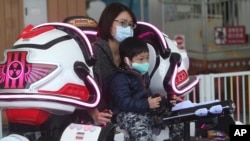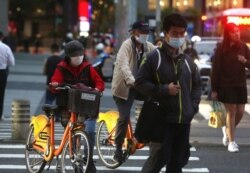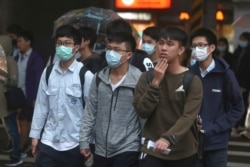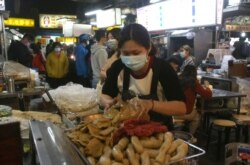Taiwan is reporting just one to six new COVID-19 cases per day. Schools, offices and restaurants are operating all but normally. But the island’s government is expected to wait until the global pandemic improves before easing restrictions that have helped contain the spread of the virus but hurt a big swathe of the economy.
Just one new case surfaced on April 5. Every other day since March 26, Taiwan’s Central Epidemic Command Center has reported two to six new cases with no threat of a widespread community outbreak. Monday’s case total reached five, bringing the overall count to 393 including six deaths and 114 recoveries.
Officials will probably keep enforcing disease control measures until the crisis overseas gets better, said Huang Ching-tai, a professor and doctor in the infectious diseases department of Chang Gung Memorial Hospital. Continued enforcement would help ensure no one flies in with the virus and spreads it around, he said.
“Taiwan’s situation presently counts as being pretty good, and we all feel relaxed, but to look at the whole world’s situation, there’s no obvious letting up,” Huang said.
“So actually, if we’re ok now, to ensure that tomorrow and next day are just as good for us, we need to keep up our cautiousness and not neglect it,” he said. “We don’t really want to consider saying the epidemic has been lifted.”
Control measures include a temporary ban on foreign visitors and required 14-day quarantine for all arrivals including transit passengers. Most of Taiwan’s cases are citizens who flew back from infected countries.
Schools in Taiwan check students daily for signs of fever and restrict extracurricular activities. Shops, banks and office complexes are asking customers to stay 1.5 meters apart or wear facemasks — which are universal in Taiwan anyway. Indoor events must not exceed 100 people.
Taiwan has kept its caseload low compared to many Asian neighbors by stopping flights early on from infected parts of China, the coronavirus origin, and tracing the contacts of confirmed patients.
The government’s Health and Welfare Minister Chen Shih-chung declined to say Monday when Taiwan might lift restrictions but said the island has entered a “stable stage” and an “observation period”. Invention of a COVID-19 vaccine would be a plus, he added.
“How we can stabilize the health situation and let everyone trend back to a normal life is something we’re always thinking about,” Chen said.
Taiwan’s service industry is struggling under the control measures and losing more business as people hesitate to go out, said Liang Kuo-yuan, president of the Polaris Research Institute research organization in Taipei.
In the food, beverage and lodging industry, 2,693 people were put on unpaid leave in the final two weeks of March, more than any other sector, according to Ministry of Labor figures.
Companies that organize events are doing little business, partly due to the ban on indoor meetings of more than 100 people. Tourism operators are seeing no clients from normal sources such as Japan, South Korea and Southeast Asia due to the curb on foreign visitors. Taiwanese scared to go out take business away shops and restaurants.
Consumers worry someone could fly into Taiwan and spark a wider outbreak, Liang said, and local media have fanned those fears. Government rules on facemasks and social distancing scare people further, he added.
“Some types of businesses will probably get better, for example if a department store is big and has a lot of space, then people will dare to shop there,” Liang said. “But if you say a restaurant, if it’s inside a packed room, then I believe it still won’t be liked.”







